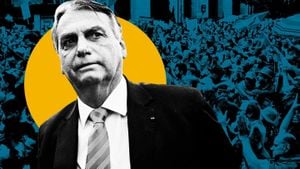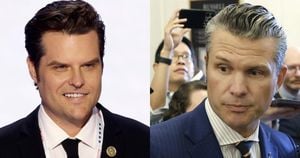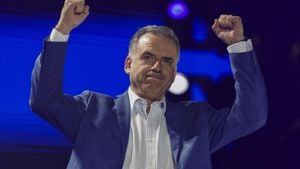Rumors and discussions about international diplomacy often captivate the public, but when those rumors involve high-profile figures like Elon Musk and Iranian officials, attention skyrockets. Recently, reports surfaced claiming Musk, the CEO of Tesla and SpaceX, met with Amir Saeid Iravani, Iran’s ambassador to the United Nations, during his trip to New York. The speculative nature of such meetings can lead to significant political repercussions, especially when relations between the United States and Iran are already fraught with tension.
On November 16, 2024, The New York Times reported on this potentially game-changing encounter, describing it as part of a broader attempt by Iran to ease tensions with the incoming administration of President-elect Donald Trump. According to this report, the conversation allegedly touched on important topics, including Iran's nuclear program and its support for various groups throughout the Middle East.
Adding to the intrigue, Iranian Foreign Minister Abbas Araghchi took to social media to address the swirling rumors. He stressed the importance of basing foreign relations on concrete evidence rather than assumptions, critiquing those who jumped to conclusions about the alleged meeting without substantiation. "When an event has not occurred... it simply has not happened and must be denied," he articulated on his X account. Araghchi’s comments highlighted the tendency for misinformation to spread rapidly, especially amid the complex nature of Iran’s foreign relations.
On the very same day, Iran’s Foreign Ministry spokesman, Esmail Baghaei, categorically denied any such meeting had taken place. Baghaei expressed surprise at the extensive media coverage of the speculation surrounding it, reinforcing the idea of it being yet another fabrication conjured by American media.
The political backdrop of this situation is as significant as the personalities involved. Iran is currently at odds with Western nations due to its contentious nuclear activities, which have led to sanctions and strained diplomatic relations. Previous U.S. administrations, particularly under Trump, withdrew from the nuclear deal with Iran and re-imposed severe economic restrictions. During Trump's presidency, tension reached new heights, especially following the assassination of Iranian General Qassem Soleimani.
Compounding the stakes, Iranian officials have made it clear through various channels, including subtle warnings and direct statements, about their intolerance for any perceived aggression from the U.S. Reports emerged indicating Iran had even contemplated hiring someone to take action against Trump; though those involved have wholly denied such claims. This hostile narrative underlines the delicate nature of any discussions surrounding U.S.-Iranian relations.
Despite public denials from Iranian officials, there were indications through various channels, including anonymous U.S. officials, hinting at the meeting's discussions pertaining to improving diplomatic relations. This suggests some level of underlying communication between the two sides, albeit unofficially.
Reactions to the reported meeting were mixed, with analysts debating its ramifications. Some see it as potential groundwork for reconciliation between the two nations, potentially hinting at future negotiations over Iran's nuclear program. Others view it as mere political theatre—an attempt by Iran to test the waters with the new Trump administration without formally engaging.
Pundits analyzing Trump's past positions on Iran and his selections for key foreign policy leaders, who are expected to take hard lines against Tehran, suggest any forward movement is fraught with significant complications. Prominent figures expected to lead Trump's foreign policy endeavors, such as Senator Marco Rubio and Representative Mike Waltz, have shown little inclination to soften rhetoric toward Iran, indicating the administration's stance could remain aggressive.
The denials from Iranian officials come amid their leadership's broader hints at possibly engaging with the Trump administration, particularly with regard to devising strategies to address sanctions and diplomatic isolation. Herein lies the complexity: the Iranian regime, traditionally vehemently opposed to Trump's past actions, must navigate its domestic pressures against the realities of international diplomacy.
Interestingly, the Obama administration had created channels of communication with Iran leading up to the landmark 2015 nuclear deal. Many analysts suggest the new administration, though led by Trump, may find itself having to adopt some of the previous administration’s strategies to begin dialogue with Iran.
The nuances of international diplomacy often revolve around seemingly inconsequential details. Questions are raised about whether meetings, regardless of how informal or provoked by rumor, hold the potential to alter the political terrain, even slightly. Observers of U.S.-Iran relations know the stakes are not just whether any meeting occurred but what it could signify moving forward.
The ambiguity surrounding the reported meeting adds another layer of complexity. Reactions from various camps indicate multiple narratives at play, both about the feasibility of improving U.S.-Iran relations and about the nature of Iran’s engagement with global leaders like Musk—who wields considerable influence by virtue of his technological prowess and public persona.
The dialogue around such high-profile engagements sheds light on the intricacies of diplomacy. Undoubtedly, any potential thawing of relations with Iran under the new Trump administration remains speculative at best. Similar past efforts have often been complicated by underlying tensions and political rhetoric on both sides. Nevertheless, when prominent figures like Musk are drawn unexpectedly to the forefront of these dialogues, the potential for impactful discussions only increases, whether or not they result from formal meetings.
Observed as part of broader geopolitical tensions involving Iran, the mere suggestion of Musk's interactions with Iranian officials suggests pathways through which diplomacy may re-emerge, albeit under difficult circumstances. Any interpretation of the aftermath remains closely watched by analysts and policymakers alike, as they seek to predict how relations between Tehran and Washington will evolve over the next administration.
Indeed, many may wonder if Elon Musk was, after all, just another cog in the diplomatic machine or if this episode signifies something more substantial, foreshadowing shifts on the diplomatic chessboard. Only time will tell how these dynamics play out, but the complexity keeps intrigue alive within the international community.



